Covid: Support group says excluded self-employed need help
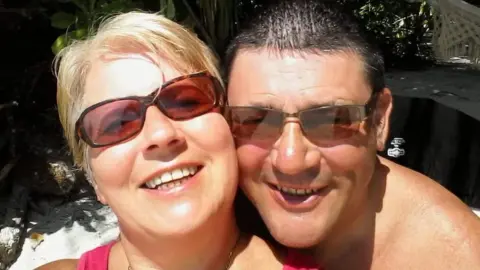 Gary Beck
Gary BeckLife savings have been spent, loans have been taken out and cars have been put up for sale by some of those affected by the financial fallout of Covid-19. Three million self-employed workers have received no help from the government during the pandemic, according to the support group Excluded UK. We spoke to three of them about the devastating impact on their lives.
Father-of-two Gary Beck is proud to say he has never claimed benefits and has always worked hard to support his family.
He served in the Falklands War of 1982 before he left the Royal Navy to retrain as an electrical fitter and built up his own company. He sold it and moved to Tenerife with his family in 2009.
They decided to return to Hatfield, Hertfordshire, five years ago when his wife Julie was diagnosed with breast cancer, and he began working for an agency in the same role.
But when the pandemic hit, the agency let him go rather than being furloughed.
"I'm 63 and I'm on the scrapheap," he says. "I have spent all of my savings, around £15,000, just to survive and pay my bills."
 Gary Beck
Gary BeckGary does not qualify for government support because he has a military pension, which covers his £700-a-month rent but not his other bills.
He has applied for countless jobs, including food delivery driver roles, but has not had any luck.
"No one wants me, they're not interested in the skills I have got," he says.
'I went to war for this country and now I need help'
He used to take home around £2,000 a month and was the main breadwinner, with his wife working as a carer on minimum wage.
But he has just received a P45 showing he has earned £18.45 since April.
Gary has put his car up for sale and says he has given up on his dream of moving to Spain to retire.
"It is crazy," he says. "You worry every day about how you are going to eat. The stress is not good for my wife's health and it's hard for me too.
"I suffer with post-traumatic stress disorder from the Falklands and this is making my mental health so much worse.
"I've been to war for this country and this is the one time I need help. I always thought the government would be there for me if I needed it."
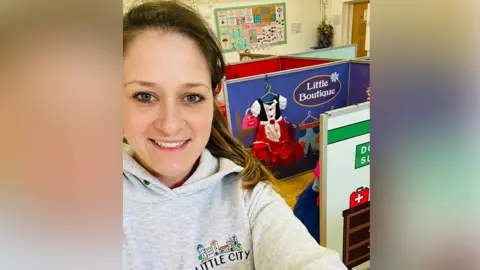 Kate Powell
Kate PowellMore than nine million people have benefited from the government's furlough scheme, which guarantees 80% of wages up to £2,500 a month for people unable to work.
However, it is thought that around three million self-employed people are not eligible for any support.
Kate Powell did not have the necessary financial track record to qualify for help because she had not been self-employed for long enough.
She worked as a nanny before she decided to buy the Suffolk franchise of a family-run business called Little City in April 2019.
It was the first franchise of the mobile role-play centre, which gives children the chance to play at being everything from doctors and hairdressers to shop owners and builders, that was available to buy.
Kate knew it would give her more flexibility, allowing her to do things like take her four-year-old daughter to school near their home in Ipswich.
"It was always a risk but I was taking my daughter to the sessions and she loved them," she says. "The children learn so much from the role-play and it is so rewarding to watch them."
Business was going really well before the pandemic and Kate was busy with her regular sessions, birthday parties and school hires.
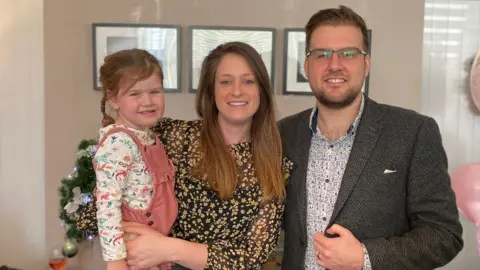 Kate Powell
Kate PowellWhen the lockdown came in March, she thought it might only be for a few weeks, but contacted HM Revenue and Customs (HMRC) when she realised it was going to last a lot longer.
'They said there was nothing they could do to help me'
"I told them I hadn't earned a single penny for months but they said there was nothing they could do to help me.
"I've had to get another loan to start paying back my business loan and the loan for my van, and the debts just keep mounting up," she says.
Kate is now looking for another job to help with the debts, while she can't open Little City.
"My little girl has pulled me through some really dark moments when I have been thinking to myself 'are we going to lose the house, am I going to be able to feed my child?'"
"It is just a constant worry and no-one knows how long this will go on for."
Adam Pearson is another person who could never have imagined his dream job could be snatched away so suddenly.
The 26-year-old, who lives in Bolton, Greater Manchester, has seen his entire industry collapse due to the pandemic.
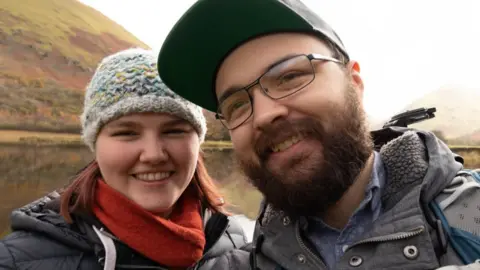 Adam Pearson
Adam PearsonHe worked as a graphic designer in events but was made redundant in March, a week before the furlough scheme came in.
Adam says he contacted his employer but they refused to take him back to furlough him.
He says he feels lucky that he lives with his parents but he still has outgoing payments for professional software and for his car.
He has applied for jobs in a pet shop and a bakery but says he is not even getting interviews, despite being a graduate with a strong employment history.
All of his savings are gone and he is surviving in his overdraft, getting further into debt each month.
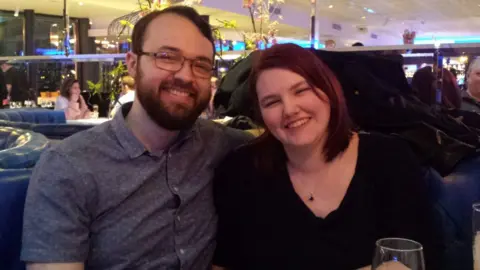 Adam Pearson
Adam PearsonHe qualifies for the minimum amount of universal credit each month, but it means he has to live apart from his girlfriend.
"We want to move in together but she has been saving for a house deposit and that would be taken into account so I would not get any universal credit, which I am using to pay some of my bills.
"I feel pretty hopeless, I just never imagined this could happen. I have had depression in the past and I can see the signs now and I am struggling," he says.
Anneka Hicks is one of the people who set up Excluded UK in May. She said it had been "heartbreaking" to watch so many people lose their livelihoods, and is calling on the government to take urgent action.
"They've lost their dignity," she said of the people she is trying to help. "Many of them have been forced to take state benefits if they can, use foodbanks to feed their families, lost their businesses, made redundancies.
"They are expected to start again with nothing, or less than nothing."
A spokesman for HM Treasury said it had put together a comprehensive package of support for the self-employed, including loans, tax deferrals, newly extended mortgage holidays and business support grants.
"We've acknowledged that not everyone has been helped in the way they would have wanted, but overall the government has provided a huge amount to help businesses and families through this crisis," the spokesman said.
"Where there have been exclusions, these have been for reasons such as targeting support to low earners or to avoid unacceptable fraud."

- LOCKDOWN LOOK-UP: The rules in your area
- SOCIAL DISTANCING: How have rules on meeting friends changed?
- SUPPORT BUBBLES: What are they and who can be in yours?
- FACE MASKS: When do I need to wear one?
- TESTING: How do I get a virus test?


Find BBC News: East of England on Facebook, Instagram and Twitter. If you have a story suggestion email eastofenglandnews@bbc.co.uk
